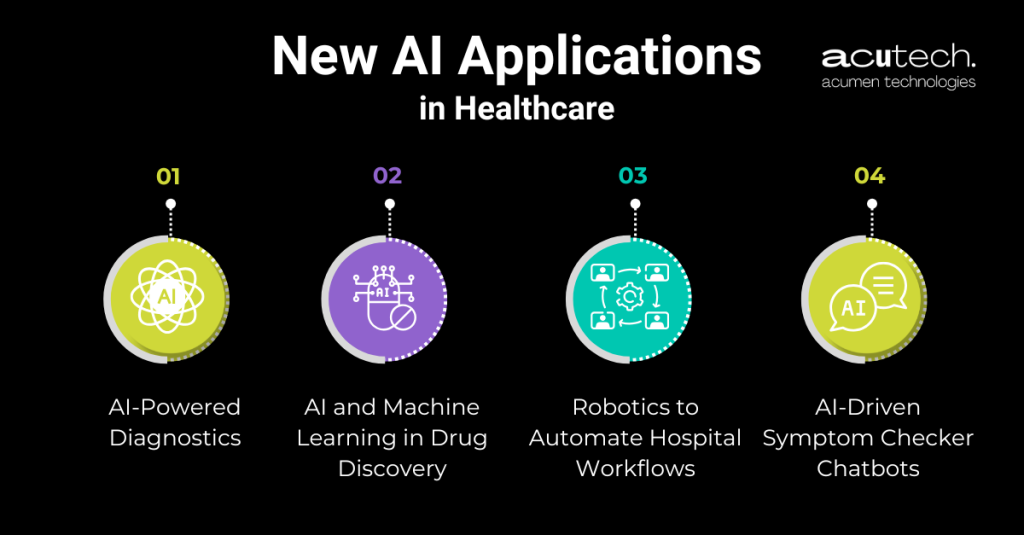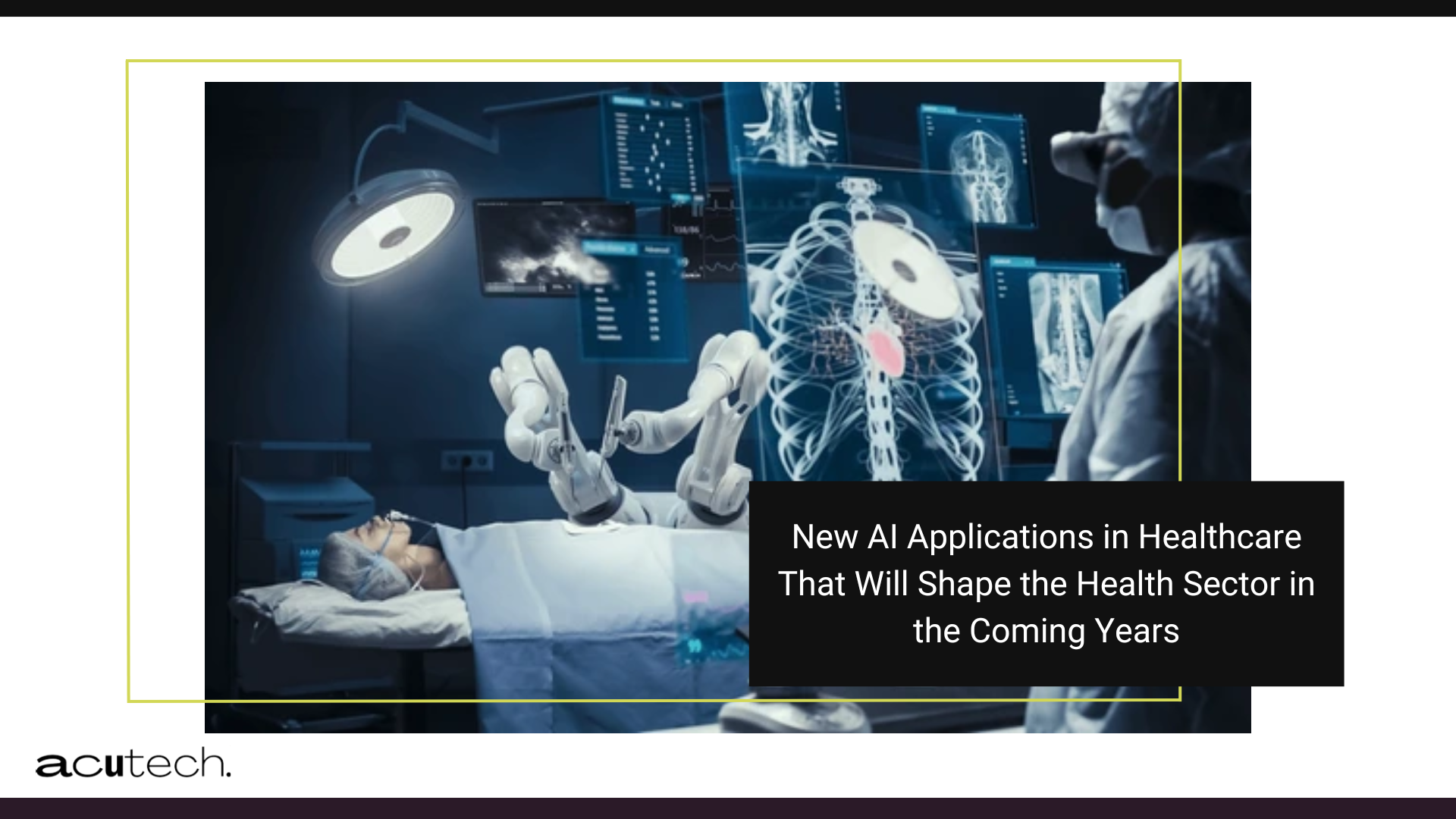How will artificial intelligence reshape healthcare in the years to come? With AI’s potential already transforming diagnostics, treatment, and hospital workflows, the future promises even more groundbreaking changes.
But which new AI applications are poised to make the biggest impact in the next few years? Let’s explore the trends that will shape healthcare and improve patient outcomes.
AI-Powered Diagnostics: The Future of Early Detection
One of the most promising areas for AI in healthcare is diagnostics. As diagnostic tools become more sophisticated, AI can play a crucial role in processing vast amounts of medical data quickly and efficiently.
AI-powered computed tomography (CT) scan analysis is already demonstrating its potential. Following the COVID-19 pandemic, the demand for faster diagnostic tools has skyrocketed. AI systems can now analyze CT scans to detect pneumonia patterns linked to COVID-19, providing clinicians with critical insights in a fraction of the time it would take a human specialist. Innovative projects like Microsoft’s InnerEye are paving the way for AI-enhanced diagnostic processes that promise to reduce the strain on healthcare professionals while improving accuracy.
With AI’s ability to assist radiologists in identifying diseases faster, the technology is becoming an indispensable tool for diagnostics – though it’s still viewed as a complement rather than a replacement for human expertise. AI helps validate diagnoses and enrich research data, but the final decision still rests with the specialist.
AI and Machine Learning in Drug Discovery
The pharmaceutical industry is also experiencing a surge in AI-driven innovation, particularly in drug discovery. AI and machine learning (ML) algorithms are speeding up the process of identifying potential drug molecules, reducing both time and cost.
For instance, the first drug molecule discovered by AI was patented in 2020 and is now undergoing clinical trials for treating obsessive-compulsive disorder. This landmark achievement showcases how AI can drastically improve drug discovery processes by simulating chemical reactions and modelling molecules. As AI continues to evolve, we can expect more groundbreaking discoveries in biopharma and medtech, leading to treatments for rare and dangerous diseases that were previously hard to address.
AI isn’t just improving speed – it’s also enhancing accuracy. By running virtual experiments, AI can minimise the need for costly on-site tests and guide researchers toward the most promising drug candidates.
Robotics to Automate Hospital Workflows
AI-powered robotics are transforming hospital workflows by automating a range of critical tasks that have traditionally required human intervention. With healthcare systems grappling with staffing shortages – exacerbated by the COVID-19 pandemic – these robotic systems can provide much-needed support. From maintaining stringent hygiene standards to monitoring patients’ vital signs, AI-driven robotics help medical teams focus on higher-level tasks without being bogged down by repetitive duties.
For instance, robots can now be employed to assist in patient transport, deliver medication, and even conduct minor surgical procedures with precision. In areas like surgery, these robots are becoming trusted assistants, handling tasks that would otherwise take up valuable time from surgeons. Beyond the operating room, robotic systems can also handle tasks like sanitizing equipment or rooms, significantly reducing human exposure to potentially harmful environments.
One of the greatest advantages of AI-driven robotics lies in their predictive maintenance capabilities. These systems can monitor their own performance and identify potential malfunctions before they become critical, alerting staff to make adjustments or repairs. This not only prevents downtime but also ensures patient care isn’t interrupted by unforeseen issues. As we see AI becoming more integrated into hospital workflows, these robotic systems will enhance efficiency, elevate patient care, and relieve overburdened healthcare staff.
AI-Driven Symptom Checker Chatbots
AI-driven chatbots are evolving rapidly and are finding important roles in healthcare. These chatbots serve as virtual assistants that help with patient engagement and provide preliminary diagnostic support. In a world where accessibility to healthcare is increasingly crucial, AI-powered chatbots provide a 24/7 solution to patient inquiries, offering assistance outside traditional clinic hours and reducing the workload on healthcare professionals.
One of the most significant benefits of AI chatbots is their ability to guide patients through symptom checks, helping them determine whether they need to seek medical attention. In situations where human medical staff might be overwhelmed, such as during an emergency or a pandemic, these chatbots serve as an initial point of contact, offering insights based on a patient’s input. Some AI chatbots are even able to integrate with electronic health records (EHR), allowing healthcare providers to track patient interactions and flag any serious issues for further review.
However, it’s essential that chatbots be carefully developed to avoid pitfalls such as misdiagnosis or misinformation. These tools should be seen as a supplement to human care, not a replacement. When implemented thoughtfully, AI chatbots can become indispensable in streamlining patient care, ensuring timely interventions, and improving overall access to healthcare services.

Integration of AI into Healthcare Systems
To fully realize the transformative power of AI in healthcare, seamless integration with existing healthcare systems is a must. Many healthcare providers are turning to scalable cloud platforms like Azure and AWS, which offer robust AI tools that can manage massive data sets and support critical healthcare applications. These platforms enable healthcare organizations to deploy AI-driven solutions that work in harmony with their existing infrastructure, facilitating smooth communication between various departments and reducing data silos.
Integrating AI into healthcare systems also means streamlining patient data management, from diagnostics to treatment plans. By doing so, healthcare organizations can ensure better coordination between doctors, nurses, and administrative staff, ultimately improving patient outcomes. Additionally, AI integration makes predictive analytics more accessible, helping providers anticipate patient needs, monitor chronic conditions, and improve preventive care.
As healthcare digitization advances, AI integration is key to unlocking new levels of efficiency. Whether it’s using AI for patient monitoring, administrative tasks, or complex diagnostics, the potential for AI to transform healthcare workflows is immense. The seamless incorporation of AI into healthcare platforms will be essential in pushing the industry toward smarter, more data-driven solutions.
Future-Proofing with AI Applications in Healthcare
As AI continues to evolve, its role in healthcare will only grow more significant. From diagnostics to drug discovery and hospital workflow automation, AI is set to revolutionize how medical care is delivered. While there are challenges – such as trust, accountability, and integration – AI’s benefits in healthcare are undeniable.
At AcuTech, we’re committed to staying ahead of the curve in AI healthcare solutions. Our expertise in cloud-based AI integration ensures that your healthcare organization can make the most of these cutting-edge technologies. Whether you’re interested in AI-powered diagnostics, robotic systems, or symptom checker chatbots, our team is ready to help you navigate the future of healthcare.
If you’re interested in learning more about how AI can transform your healthcare operations, contact us to and explore how you can leverage the latest in AI applications to enhance patient care and operational efficiency.


